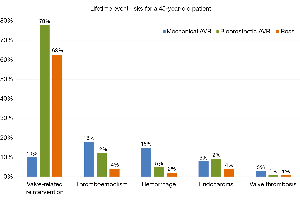Clinical and quality of life outcomes after aortic valve replacement and aortic root surgery in adult patients <65 years old
Abstract
Selecting the optimal surgical treatment strategy in patients below the age of 65 years (i.e., non-elderly patients) with aortic valve or aortic root disease remains challenging. The objective of the current study is to summarize contemporary research on clinical and quality of life outcomes after aortic valve replacement (AVR) and aortic root surgery in non-elderly patients. Recent systematic reviews on clinical outcome after biological and mechanical AVR, the Ross procedure and aortic root surgery show that event occurrence is considerable after any type of AVR or aortic root surgery and—with the exception of the Ross procedure—survival is suboptimal. Although thromboembolism and bleeding events are more common after mechanical AVR and root surgery, these events are also considerably present after biological AVR, the Ross procedure and valve-sparing aortic root surgery (VSRR). Similarly, reoperation is more common after biological AVR, the Ross procedure and VSRR, but also occurs frequently after mechanical AVR and root replacement. Published evidence in AVR patients points to the direction of better health-related quality of life (HRQoL) outcomes with a biological solutions, while the HRQoL after aortic root surgery is limited and contradictory. This review illustrates that treatment for non-elderly aortic valve and aortic root disease patients needs to be tailored to the individual patient, considering both clinical and HRQoL outcomes as crucial factors to reach a treatment decision that best reflects the patient’s values and goals in life.
Cover






